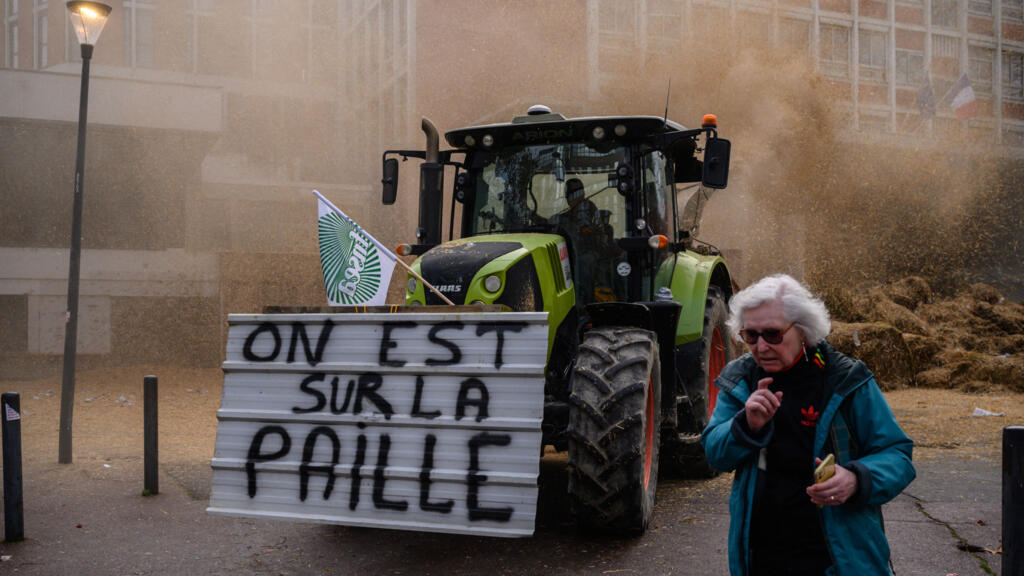French farmers have engaged in a standoff with the government to express anger over a perceived lack of respect, rising costs and suffocating EU regulation. Prime Minister Gabriel Attal seeks to calm the protesters while the far-right National Rally hopes to take advantage of their anger, just five months before the European elections.
France’s farmers are angry with their government. Several dozen of them have been blocking a portion of the A64 highway near Toulouse since January 18 to express their anger. Then an explosion between Thursday and Friday night blew out the windows of a local government building in the nearby city of Carcassonne. Two graffiti tags left at the scene attributed the act to a mysterious collective of winemakers.
“It is not insignificant that this [the protest movement] comes from the south of the country,” said François Purseigle, a sociology professor at the French agronomy faculty of the Toulouse Institute of Technology. “Farmers are on the frontline of climate change, with successive droughts taking place, and they have been repeatedly told they are not doing enough for the environment.”
Surprised by the farmers’ blockades, France’s government announced a delay of “several weeks’” for reforms announced over a year ago to help farmers. The stakes are high: France lost 20% (101,000) of its farms between 2010 and 2020, according to a recent survey.
“Many young people today prefer to avoid self-employment because they would earn less than a farm employee, and this should not be the case,” said Yohann Barbe, a cattle farmer in the Vosges department in northeastern France. Successive governments have been struggling to stop the phenomenon. “Nearly 200,000 farmers will be of retirement age by 2026, but there are not enough buyers [to take over their farms],” said Purseigle. “There is a gap between Macron’s speech on ‘civic rearmament’ and the reality of farmers who feel completely disarmed.”
‘We can’t expect farmers to shoulder the ecological transition’
The vulnerabilities of farmers are increasing day by day. “Emmanuel Macron made a great speech on agriculture during a meeting at Rungis International Market in 2017, but never acted upon it. We’re fed up,” Barbe said.
Protestors say their movement, which originated in the southwest, is bound to spread nationwide, especially if the government does not quickly respond to their grievances. These include the government’s move to increase taxes on agricultural diesel, a polluting fuel, used by farmers, that has long benefited from government tax breaks. The move will directly affect the sector’s production costs.
Farmers are also denouncing non-compliance with a law passed in 2018 which guarantees that hikes in production costs be covered by the agrifood chain through trade negotiations.
“I sell my milk to Savencia (an agribusiness group), even though I don’t even know how much milk will cost on February 1, because we didn’t reach an agreement with them in December,” said Barbe, who is also a member of the National Federation of Farmers’ Unions (FNSEA). In another example, the 2018 law required 20% of the food distributed in canteens to be organic by 2022, but the threshold is still stagnating at around 6%, according to the French newspaper Les Echos. “We can’t expect farmers to shoulder the ecological transition by themselves,” said Barbe.
The European Union targeted
Also jarring to farmers are the mounting environmental standards put on agricultural production. They point out that the frequent transposition of European directives make national standards even stricter than European standards. “We are not against more supervision, but we need compensation on prices,” said Barbe. This comes at the risk of losing to foreign competition. France imported more than one chicken out of two consumed in 2022 from abroad (notably, from Belgium, Poland and Brazil).
The farmers are also holding the European Union itself responsible for their situation. With a budget of €53.7 billion for the 2023-2027 mandate, the Common Agricultural Policy (CAP) implements a system of agricultural subsidies and other programmes. Farmers describe it as dysfunctional. “For the first time, the CAP subsidies have still not yet been paid to all our farmers in 2023. Several farmers are having problems with their bank or their suppliers, who they weren’t able to pay as a result,” said Barbe.
The far-right National Rally did not hesitate to use this anger against Brussels to launch its campaign for the European elections in June. Jordan Bardella, chief of the National Rally, spent last Sunday with workers on the wine-growing lands of Médoc.
“The European Union and the Europe of Macron (want) the death of our agriculture,” said Bardella. “French farmers are exposed to unfair competition from products from around the world which don’t respect the strict standards that they (French producers) have to observe,” he added.
For Purseigle, the farmers’ anger will be a major theme in the coming European elections. “If they have succeeded in one area, it is in putting agricultural issues on the political agenda,” he said. The newly appointed Prime Minister Gabriel Attal also rushed to the Rhône department in east-central France on Saturday before receiving the FNSEA and the Young Farmers Union Monday in an effort to calm the discontent. “Politics is also about responding to emotions,” Purseigle noted.
As for the farmers, they have already announced they won’t hesitate to block Paris and disrupt the Paris International Agricultural Show, which begins on February 24, if the government ignores their demands.
This article was translated from the original in French.
MORE : Sunak must be replaced as PM, says former cabinet minister Sir Simon Clarke
MORE : ‘Grace died protecting her friend’ – Paper Talk


